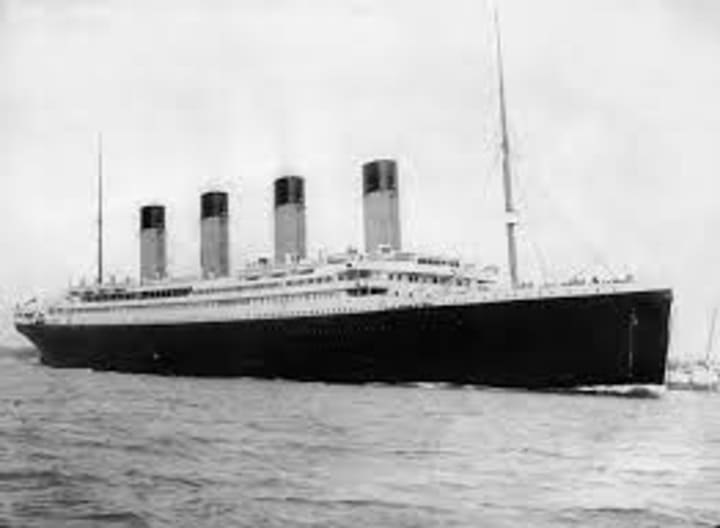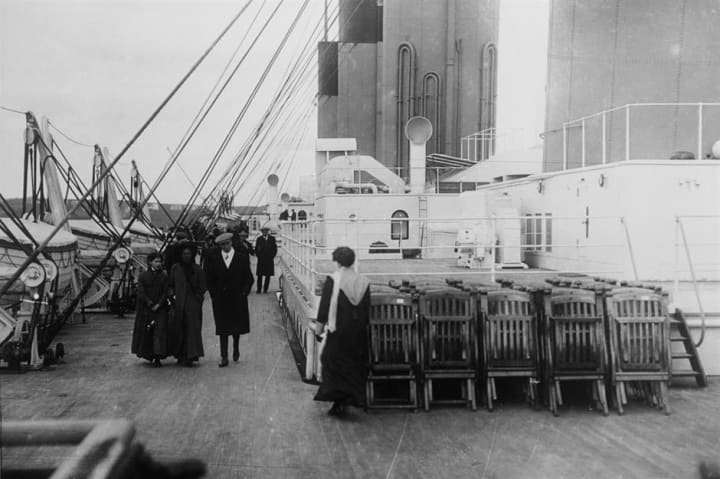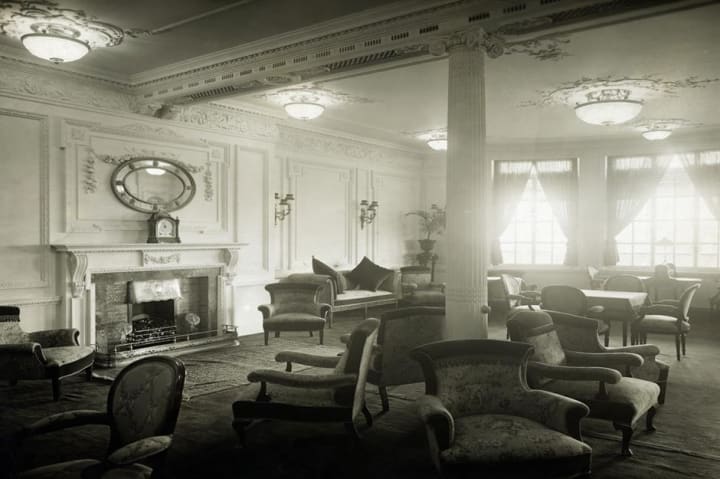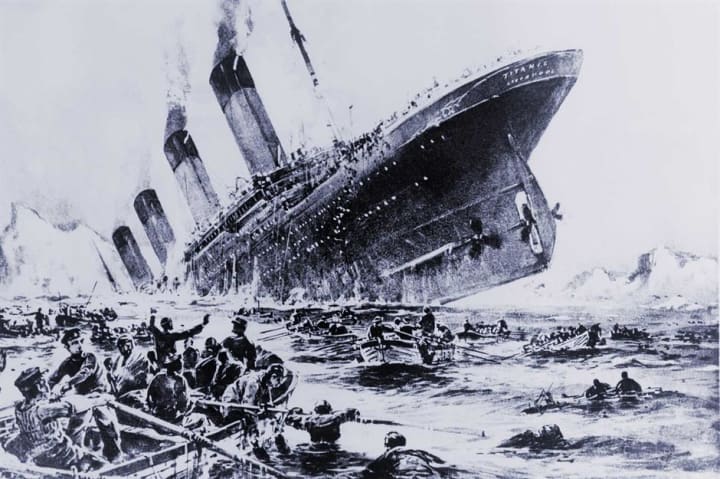Alone on a wide wide sea
A tale of the Titanic
It was cold and clear; a crisp night. Which could be expected on a moonless night, she told herself, looking up at the stars as she crossed the foredeck. There’s so many of them. What light they made, rippled in the ship’s wake along with the cabin lights, all magnified in their own reflection. She was quick to open the door on the port side, making her way into the stairwell the crew used.
When the ship brushed along side of the iceberg Marjorie had felt the bump, thinking it strange. She’d thought nothing more of it until she saw Eamon, the young steward whose eye she’d caught earlier, approaching her. He looked stricken, as if some horrible disaster had befallen him, and him alone. She was in the front of the ship—in the Forecastle where the crew’s quarters were—laughing and dancing with other stewards and maids. Someone was playing a violin.
“The ship’s hit something,” Eamon said. “An iceberg, I think,” he added. “Brushed up against it, they’re saying. I’m off to check for damages. Captain’s orders. It should be okay, but you should get to the lifeboats, just in case.”
“In case of what?” she asked, the lilt in her voice sounding like a promise he knew she’d never be able to keep. She looked confused for a moment, and turned to look back at the party.
“Did you not hear me?” he asked, grabbing her by the arm and shaking her. He was being rough with her. Pulling her over to the starboard side of the ship and into the shadows, he forced her hand against the panelled wall.
“Can you feel that?” he asked. “There’s no vibration. They’ve stopped the ship.”
“Let me go,” she said, pulling herself out of his grip.
She could see several of the crewmen looking at them. Marjorie backed away from him, pressing herself up against the wall, stepping out of the shadows. She was starting to believe maybe there was something wrong. She remembered the bump. She could also see it in the misting of his eyes, as well as hear it in the timbre of his voice. He let go of her immediately, of course, but still, she could sense that something wasn’t right. He looked at her in the mounting silence and she thought he was trying to collect himself before trying to explain things to her.
“Can’t you feel it?” he asked again. His voice was softer now, perhaps he was thinking it would reassure her, she thought; it didn’t. She pressed her hands against the wall behind her in spite of her not wanting to hear what he had to say.
“That’s water coming in. This ship’s going to sink!” he hissed.
“Impossible! It’s unsinkable!” She tried to laugh the whole thing off, hoping her laughter would hide her nervousness.
“Is it?” he said, hitting the port hole above her with a slap, pointing at the dark shadow he claimed was the iceberg they’d hit. “See that? Still think she’s unsinkable?” he asked. “She’s taking on water, Marjorie. Do you know what happens when a ship takes on water? It sinks. You have to get up on deck. Now! That’s where the lifeboats are.”
“And how do I get there? I don’t know even know how I got here,” she said, and there was that forced laugh again.
“Follow the Scotland Road. It’ll take you all the way to the back of the ship.”
“You mean the stern?” she asked.
“Good. Thank God you know that much. Now listen to me,” he hissed again, looking at the crewmen standing nearby, watching him; they were all listening. She could sense he was trying not to let the panic take him over; trying to remain calm. For her sake.
“No one’s going to stop you. Not now. Just follow the corridor. It’s on the port side. Do you know which side that is? It’s your left.”
“I know which side the port side is.”
“Take the Scotland Road. You have to go down to E deck. It’ll take you right to the Aft Grand Staircase. You can get up to the B deck promenade from there. You have to get into one of the boats. Please? You have to believe me. If you go now, you won’t have any trouble getting in one of the boats. There’s not enough of them for everyone on board,” he added, lowering his voice.
“What about my mother and brother?” she asked, suddenly aware of the silence that seemed to have taken over the room. She looked out of the porthole, stepped toward it and pushed it open. She stared into the darkness, the only sound was her heart racing in her breast.
“You can pick them up on your way there.”
“Aren’t you coming?” she asked nervously.
“I’ve got other things that need doing. I told you, Captain’s orders.”
“Captain’s orders?” she scoffed. “What other things?” she asked.
“My duty,” he said, and left.
“What was that he said, Marjorie?” one of the stewards asked, looking out of the port hole at the dark shadow looming in the distance. The ship was still slicing through the water, but they could all sense that it was slowing down and coming to a stop.
“She’s hit an iceberg. He says the ship’s sinking.”
Suddenly there was a deafening roar as the boilers released built up steam through the ship’s funnels. It was a high pitched whistle, sounding as if someone had left the kettle on for too long, finally settling down into a two toned drone that split the night.

Chunks of ice had rained across the forecastle deck where the ship had brushed alongside the iceberg. Larger pieces of ice had skittered across the deck as though they were shuffleboard pieces kicked out of the way; the smaller pieces had already frozen to the deck. Marjorie’s first question was how had the watchman not noticed something as large as an iceberg? It loomed like a dark shadow in the darker distance now that the ship had come to a full stop.
People were out on the deck, picking up blocks of ice and snow, throwing snowballs out at the water. Some of the people were still wearing nightclothes—the curious come to see for themselves, she supposed—but some of the passengers bundled up in heavy coats as though expecting the worst. They were all looking at the wall of ice in the distance, its bulk almost visible in the darkness surrounding them.
She couldn’t hear herself think for all the noise of the boilers erupting through the large funnels. It was almost midnight and the temperature was already below freezing. Marjorie could feel the cold now that she’d stopped dancing. Her hands were turning blue from the biting cold; it seemed as if everything she touched was cold and wet, every railing, and piece of metal sheeting, sweating with the evening’s dew. She could see that some of the rails and struts were coated in frost. She placed her hands under her armpits and hugged herself, looking at the crowd of people and wondering if what Eamon had said was true. No one seemed to think there was any danger.
She ran to the port side, looking down the length of the ship at the lifeboats still in place. She ran to the other side of the deck, looking down at the water level. She couldn’t tell if the ship was taking on water or not, but it appeared that the water near the bow was moving. It reminded her of water slowly draining in a bathtub.
“The ship’s unsinkable,” she heard someone screaming in an effort to be heard above the noise of the whistling steam. She found herself moving closer so she might listen.
“I don’t care what they say. I don’t believe it for a moment.”
“Believe what you want Kat, but I’m telling you, they have watertight doors. I was talking to Mr. Andrews just the other day—he’s one of the ship’s builders—and he said four of the ship’s compartments can fill up with water, and she’ll still float. You’re panicking over nothing. One of her sister ships had a collision with a freighter last year and made it to her destination with two of her compartments full of water.”
“I don’t care,” the woman said, and Marjorie turned to look at her. She was holding a sleeping child in her arms, either trying to comfort it, or herself, and Marjorie wondered how a child could sleep so peacefully with all the noise.
“Look, if you want to go to the boat stations, I’ll take you there, but I promise, there’s no need to worry.”
“No? Then why are they letting the steam out?”
It was the same thing she wanted to know herself.
“It’s just a precaution,” he said. “They have to vent the steam when they stop the engines, or else they’ll blow with all the built up pressure.”
Suddenly the band started playing and everyone turned to look. The sound seeped out across the water, almost audible above the steady whistling steam, and she thought if she were closer she might be able to make out what they were playing.
She desperately wanted to believe what the man was saying as she made her way to port side entryway, opening the door. The entryway was well lit, white panelled walls leading to a wide stairwell immediately on her left. The door closed behind her with a whisper, and she could hear the whistling noise subsiding as she made her way down the stairs toward E deck. The only sound she could hear now was a constant ringing in her ears. Some of the people on deck had made their way inside, their fears put to rest for the moment, perhaps thinking there was no need to worry. She made her way down the stairwell until she finally reached E deck.
She stepped into the open foyer, followed it and saw a long corridor. The Scotland Road, the crew members called it. It bisected the length of the ship from bow to stern, used by both the crew, as well as the Third Class passengers. She’d asked one of the stewards yesterday why they called it Scotland Road, and he’d told her the men refinishing it had named it. The ship’s keel had originally been laid in Ireland, and then the ship was sailed to Liverpool. One of the main roads bisecting that city was the Scotland Road. He told her the officers called it Park Lane.
There was no one about, and she found herself running the length of the ship, hoping she wasn’t too late. Scotland Road was wide, well lit, with open pipes and cables in the shadows above her running the length of the corridor. The floor was made of wood, not carpeted like the other decks, or tiled, and she could hear her footsteps echoing as she ran.
She imagined her mother would’ve been awakened by either the noise of the steam ejecting through the ship’s funnels, or the ship brushing up against the iceberg. Her mother’s first thought would be for her children’s safety, of course, and once she’d discovered Marjorie was missing, she’d probably make her way topside to look for her.
And what about Emil, she wondered? Surely her mother had stopped by his suite? At sixteen, it seemed that he was able to wander the ship with impunity. As a young man, he had a certain latitude that was never questioned—not when she thought about the restrictions her mother had enforced on her. She had no doubt he’d try to wheedle his way into either the Second, or Third Class saloons. It made her wonder if a ship this size might have a brothel. She’d heard rumours.
She was quick to make her way up from E Deck, until she came to the Aft Grand Staircase. Its large, ornately carved bannisters were made out of deep, rich, wood. It was the same as the forward Grand Staircase near the front of the ship, but with a smaller illuminated dome at the centre. A simple clock graced the main landing in contrast to the ornate “Honour and Glory” clock of the forward Staircase. One could access the Smoking Room immediately off the A-Deck level, and the Lounge through a long companionway with revolving doors on the port side.
The whole of the B-Deck foyer was used as a reception area for patrons of the À la Carte Restaurant and the Café Parisienne. Emil had said it was designed in the Georgian style, and she saw no reason not to believe him. The timbered ceiling was painted white, like the main Reception Room on D-Deck. There was a coat storage area and comfortable rattan seating area with chairs and sofas arranged in groups throughout the room. It only spanned three decks, but it gave access to the First Class Smoke Room, the First Class Promenade, and the First Class Lounge. She was quick to make her way to the B Deck cabins.
The B Deck cabins were for both Second Class and First Class passengers. Large white decorative tiles with modern mosaics, open spaces and seating areas for passengers to sit and read, it was lit with fixtures of brass and glass, dark wood panelling and the same white panelled and timbered ceiling. She made her way through the companionway, her steps hurried. People were coming out of their staterooms wearing lifebelts and heavy clothes. They looked at her as she pushed her way passed them. She could feel her heart racing as she made it to the small stateroom she shared with her mother.
“Where have you been?” her mother asked, looking frantic with worry. Her eyes were red-rimmed, and her hair in disarray, looking as if she just woke up. She was wearing her lifebelt over her heavy, woollen coat, twisting a second lifebelt in her hands, adjusting the straps.
“I went upstairs to see what happened,” Marjorie explained.
“Don’t you lie to me, child,” her mother chastened her. “I’ve been awake since I felt the bump. Where’s your brother?”
“I was hoping he’d be here,” she said.
“Well, he’s not. And he’s not in his stateroom, either. I checked.”
“We have to find him. The ship’s sinking.”
“It can’t sink. It’s supposed to be unsinkable. Put this on, and be quick about it,” she added, throwing the lifebelt at her.

The air was crisp and she could see the steam of the boilers sifting through two of the ship’s funnels. It settled around the ship as though a fog. She watched three sailors struggling to free one of the ship’s lifeboats, their breath pluming over their heads as they laboured with their task. One of the davits holding the lifeboat was frozen and had been lowered too fast. The lifeboat’s bow dipped, pointing toward the water as they tried to right it. She watched as two men tried jumping into it, hoping to jar the mechanism loose. The lifeboat pitched sideways, spilling the men into the water and Marjorie ran to the rail, looking to see if one of them had been her brother. It was something he would’ve been happy to try, she told herself. The sailors were quick to reverse the chains, righting the boat before bringing it back up and helping passengers to climb in.
“Women and children only. There’s plenty of time, and enough room for everyone,” Mr. Lightoller, the Second Officer was saying, trying to sound calm. He was watching the bow. The ship was starting to list noticeably.
“Are we sinking?” someone asked him, and Marjorie turned to look at a well dressed man in evening wear, smoking a cigar. He appeared calm, and even tried to smile when Marjorie looked at him, and then Mr Lightoller.
Lightoller shook his head slightly, as he held his hand out, helping another woman into the lifeboat. “It’s just a precaution,” he said. “The Britannic had a run in with a freighter last year, and still managed to sail to its destination. The Olympic was hit in the harbour, in the stern, and stayed afloat. The ship brushed up against the side of an iceberg. They’re going to check for damage and then we’ll be on our way. As I said, it’s just a precaution.”
Someone fired a flare that lit up the night sky. Marjorie could see the flare’s light reflecting off the distant iceberg, a stain of red paint running along the length of it, looking like blood. The sound of the ship’s dying boilers pulsed across the endless sea, sounding very much like a two toned plea for help, like the last beating of the ship’s mechanical heart, finally fading. Still, the water was calm, as smooth as glass, and looking at it, Marjorie marvelled at the sight of it. For the past three days the waters had been smooth—they were normally rougher, she remembered somebody saying—rough enough that some of the waves had whitecaps on them.
She looked around the deck, running from the port side to the starboard, looking for her brother. He was only sixteen. Surely he’d be allowed on one of the lifeboats?
“Marjorie!” her mother called out.
“You there! Girl! Get in the lifeboat!” a sailor called to her.
“I have to find my brother!” she called back.
“He’ll be on the starboard side if he’s not here. There’s no time to be looking about. Get in while you can!”
“I’m not leaving without him.”
“Suit yourself,” he said, and turned to the next woman in line.
“You really should get into one of the boats,” the man who spoke up earlier said. He looked calm, staring out over her head at the shadow that was the iceberg. He was still smoking his thin cigar. His hair was cut short, the small beard he had neat and trimmed.
“Surely it won’t sink,” she said to him.
“Hopefully it won’t. It shouldn’t. But why take the chance?”
“Are you not going to climb in?”
“Women and children first they keep telling us.”
“How many people can fit into the boats?”
“How many?” he smiled. “More than they’re taking if that’s any indication of how many they’re letting on,” he said, nodding his head at the lifeboat as it moved away from the ship.
“That’s not even close to full!” she said, looking at the near empty boat.
“I count less than two dozen,” he said gently.
“Why are they letting them go, then? They should be taking more passengers off the ship.”
“They should be, but they’re not.”

The silence was somehow more ominous than the whistling boilers which had stopped some time ago. The only sound now was the music the band was playing—soft, low and plaintive—it was meant to calm the remaining passengers; to placate those remaining on board. It was a low mournful melody of music that transcended both time and place, a melancholy tune that was met and greeted with a brandy snifter and lit cigar. Marjorie watched a young man escorting his young wife to one of the lifeboats, asking if he might join her, considering her delicate condition. Lightoller shook his head, looking regretful as he handed Marjorie to the waiting seaman.
“I’m sorry, Mr. Astor, women and children first.”
Marjorie had been unable to find her brother, and realized if she didn’t get into one of the few remaining lifeboats, she wouldn’t be getting off the ship. She’d watched her mother being forced into one of the first lifeboats. Now, it was sitting at a distance from the sinking ship—a small lantern held aloft the only sign it was even out there. She supposed the women in the boat would want to wait as long as they could, hoping perhaps their loved ones would somehow survive.
When she’d heard Mr. Lightoller calling out for any remaining women or children she’d fought her way through the packed throng, suddenly feeling desperate to get away. The water was slowly making its way toward them; inexorable; relentless; its cold breath steaming, leaving a chill of darkness in its wake. Suddenly there was a gunshot, followed by screams of anger as the crowd parted to let her through.
“In you go miss,” Lightoller said. “Not much time now,” he added, nodding to Quartermaster Perkis. The man was quick to get into the boat and help with the falls. He was a slender man with a large handlebar moustache and short dark hair parted down the middle.
Marjorie sat silent, not looking at anyone, but staring up at the ship. She watched as several open portholes started to take in water. Someone had lowered the gangway, hoping to load more passengers into the lifeboats, but the listing ship held the lifeboats out over the cold dark water, tantalizingly out of reach.
And then lifeboat stopped.
“The tackle’s jammed!” Perkis cried out, manning the stern falls.
Lightoller looked over the rail.
“What’s wrong?” he called down.
“I’ll have to cut the falls, sir. I could use some help,” he said, trying not to sound desperate, but they could all hear the quiver in his voice.
A moment later, a sailor shinnied down the ropes, a long knife tucked into his belt. Marjorie turned and saw the bow of the lifeboat dip into the water when Perkis cut the rope. The sailor managed to cut through the stern ropes and the boat crashed down into the water. Several women screamed out, perhaps thinking they’d all be sucked down with the ship. Perkis untangled the fore rope, casting it into the water, and the two men reached for the oars, using them to push away from the ship.
Then Marjorie looked up and saw Emil staring down from the open gangway.
“Emil!” she screamed, standing up and waving her arms over her head. “Emil! Jump!”
“Sit down! Do you want to tip us over?” Perkis yelled at her.
She looked at the Quartermaster. “It’s my brother. We have to wait.”
“We’re not waiting for him to make up his mind. If we wait, we’ll be sucked down with her.”
“You can’t leave him!”
There was a high pitched whistle, and Captain Smith called down to them, using the megaphone.
“Bring that boat back! You’re only half full!”
“You heard what he said,” Marjorie said, turning to look at the man, half expecting him obey the Captain.
“I told you, we’re not going back. They’re on their own. You ever seen what happens when a ship that size sinks? It’ll be the death of us all if we go back now. Everything within a hundred yards will get sucked down with it.”
Marjorie stood up again.
“Emil! Emil, jump! Swim out to us! Stop rowing,” she said, turning to look at the Quartermaster.
“And I said sit down before you tip the boat!”
“It’s too big to tip over!” she yelled at him.
“If he jumps in, he’ll freeze to death in three minutes. I know. I’ve seen it.”
Emil jumped.
“Then give him three minutes,” she said, first looking at the sailor, and then Perkis. “Please. He’s my brother. He’s only sixteen.”
“He’s a boy,” Mrs. Astor spoke up. “A child,” she added.
“Damn you woman, don’t you start on me.”
“Mr. Perkis!” the young sailor called out. “We owe him that much if he’s willing to swim for it.”
They pulled him out of the water, and he sat beside Marjorie, shivering. Mrs. Astor gave him her fur coat to wear.
“Take your jacket off,” Marjorie said, helping him. She wrapped the fur coat around him and hugged him close to her. She used the hem of her dress to dry his hair.
There was a sudden cry as all the lights on the ship went out. The ship was nothing more than a dark shadow silhouetted against the night—slipping into a large abyss from which she knew there would be no escape. They could hear the ship’s hull groaning, and she could see the stern lifting up out of the water. A great cry of humanity resounded across the still waters as the music suddenly stopped—the band had played its last song—and the only sound was that of the great ship splitting in two. It was a moment before she saw the stern rise up out of the water, standing as though it was an altar to the deep, gently slipping under the water with a silence that seemed to settle across the horizon. The only sound remaining was that of the few who had somehow escaped the huge vortex following the ship to the bottom of the sea. In five minutes, the only sound was the weeping of those survivors scouring the watery graveyard.

About the Creator
ben woestenburg
A blue-collar writer, I write stories to entertain myself. I have varied interests, and have a variety of stories. From dragons and dragonslayers, to saints, sinners and everything in between. But for now, I'm trying to build an audience...






Comments
There are no comments for this story
Be the first to respond and start the conversation.